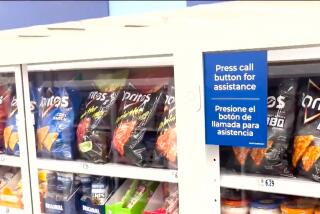A rotating panel of experts from the worlds of philosophy, psychology and religion offer their perspective on the dilemmas that come with living in Southern California.
- Share via
Today’s question: Shoplifting is so prevalent in the United States that it has become an accepted part of doing business for many enterprises. How should you respond if you witness someone stealing in a crowded store? Should your response be influenced by whether the stolen item is a luxury or a necessity, such as food?
Shabbir Mansuri
Director, Council on Islamic Education, Fountain Valley
Clearly, stealing is morally wrong, as it violates the personal and property rights of others, leading to injustice. As a general rule, those witnessed stealing something, whether in a crowded store or otherwise, should be identified to the appropriate authorities and subject to relevant charges. Of course, the nature of the item stolen has a mitigating factor on the punishment. Luxury items (or other nonessentials for survival) warrant full prosecution. At the same time, it is unjust for a society to allow conditions in which people find themselves stealing food or essential clothing. In such cases, compassion must operate and measures must be taken to rectify the societal failings that cause them to exist.
Father Jeremiah J. McCarthy
Rector/President, St. John’s Seminary, Camarillo
We all have a stake in maintaining ethical standards, such as honesty, which are essential to public order and the preservation of the common good. Shoplifting is theft and is not justifiable. If I observed shoplifting I would notify store security so that the appropriate action could be taken. All people have a right to the basic necessities to sustain life, and those who are the have-nots require justice from those who are materially secure. Severe economic distress often motivates shoplifting, and we should support public policies, such as an increase in the minimum wage, that enable people to care for their families.
The Rev. Ken Uyeda Fong
Pastor, Evergreen Baptist Church, Rosemead
Proverbs 6:30--”Men do not despise a thief if he steals to satisfy his hunger when he is starving”--seems to say that God makes allowances for famished shoplifters. But the Ten Commandments (Exodus 20:15), Jesus (Matthew 19:18) and Paul (Ephesians 4:28) clearly teach that stealing is always a sin. Thus the proverb must be more descriptive than it is instructional. When any of us close our eyes to acts of thievery, be they as blatant as the looting during the 1992 riots or as moving as a waif swiping an apple, we are tacitly contributing to the stealing of the moral conscience of our society. Stealing is never harmless because it violates us all.
Compiled by K. CONNIE KANG, Times staff writer
More to Read
Sign up for Essential California
The most important California stories and recommendations in your inbox every morning.
You may occasionally receive promotional content from the Los Angeles Times.










